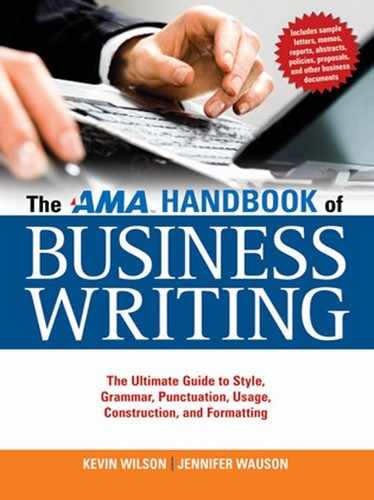W
WAIT ON
When wait refers to time, on is not needed.
Incorrect: Please do not wait on me if I am not at the station when you arrive.
Correct: Please do not wait for me if I am not at the station when you arrive.
When the word refers to the actions of a waiter or waitress, wait on is acceptable.
Correct: The headwaiter assigned the red-haired woman to wait on me.
WANDER, WONDER
Wander means to walk around with no destination in mind.
Wonder, as a noun, means astonishment or curiosity. As a verb, it means to feel curiosity or doubt.
WEB
Web is short for World Wide Web.
Spell out World Wide Web in your first usage and then use Web thereafter. When referring to the Internet, Web is always capitalized.
Example: Web page, Web browser, Web address, Web site
Although the abbreviation for World Wide Web is www, Web is the preferred abbreviation in business writing.
WEBLOG
WEB PAGES, WEB SITE
A Web page is a individual page on a Web site, which is a collection of text and graphics at a particular IP address on the World Wide Web.
Capitalize Web in both Web page and Web site.
WEIGHTS AND MEASURES
Consider the following guidelines when writing about weights and measurements:
![]() Abbreviations are used without capitalization.
Abbreviations are used without capitalization.
Example: 6 lb 3 oz, 6 pounds 3 ounce.
Example: 192 lb, 192 pound.
![]() In a compound adjective showing a weight or a measure, the numeral is hyphenated with a singular noun.
In a compound adjective showing a weight or a measure, the numeral is hyphenated with a singular noun.
Example: a speed of 600 miles an hour, a 600-mile-an-hour speed.
Example: a workweek of 40 hours, a 40-hour workweek.
WELL, GOOD
WENT, GONE
WHEN, WHETHER
WHERE
Whether used as an adverb or a conjunction, where denotes position or place.
Where should never be used as a substitute for that when introducing a clause.
Incorrect: Did you read in the paper where our mayor was honored at a banquet?
Correct: Did you read in the paper that our mayor was honored at a banquet?
WHETHER OR NOT
When whether is used to introduce a statement involving multiple alternatives, do not use not.
Incorrect: She didn’t know whether or not to go first to the drugstore or to the cleaners.
Correct: She didn’t know whether to go first to the drugstore or to the cleaners.
WHICH
When used to introduce a clause, which must refer to a specific noun or pronoun and not to a whole situation.
Incorrect: He did not arrive in time for the meeting, which caused the president embarrassment.
Correct: His failure to arrive in time for the meeting caused the president embarrassment.
Correct: His failure to arrive, which caused the president embarrassment, was the reason for his dismissal.
WHO’S, WHOSE
Who’s is a contraction for who is.
Example: Who’s working the night shift this week?
Whose is the possessive form of who.
Example: Whose work clothes are those on the floor.
WHO, WHICH
Who is used to refer to people.
Which refers to objects.
Correct: She is the woman who smiled at him.
Correct: She is the kind of person whom everyone likes.
Correct: I read the book on bridges, which I found fascinating.
WHO, WHOM
When determining whether to use who or whom in a sentence, rephrase the sentence using he and him.
Example: Who/whom is responsible? He is responsible. Who is responsible?
Example: Give the box to who/whom? Give the box to him. Give the box to whom?
WILL, SHALL
WITHIN, INSIDE OF
WOMAN, FEMALE
WONDER, WANDER
WORD CLASSES
The major word classes include the following:
![]() Verbs
Verbs
![]() Nouns
Nouns
![]() Determiners
Determiners
![]() Adjectives
Adjectives
![]() Adverbs
Adverbs
![]() Prepositions
Prepositions
![]() Conjunctions
Conjunctions
WORDS OR FIGURES
WORDY EXPRESSIONS
WOULD OF
See Might of, Should of, Would of, Could of.
